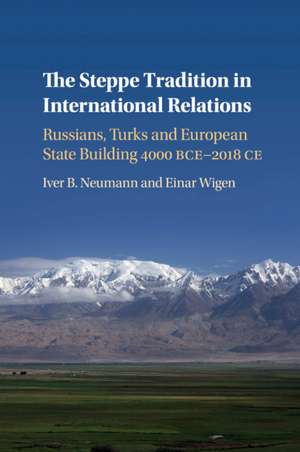The Steppe Tradition in International Relations: Russians, Turks and European State Building 4000 BCE-2017 CE
Autor Iver B. Neumann, Einar Wigenen Limba Engleză Paperback – 26 feb 2020
| Toate formatele și edițiile | Preț | Express |
|---|---|---|
| Paperback (1) | 287.07 lei 6-8 săpt. | |
| Cambridge University Press – 26 feb 2020 | 287.07 lei 6-8 săpt. | |
| Hardback (1) | 697.62 lei 6-8 săpt. | |
| Cambridge University Press – 18 iul 2018 | 697.62 lei 6-8 săpt. |
Preț: 287.07 lei
Nou
Puncte Express: 431
Preț estimativ în valută:
54.93€ • 57.50$ • 45.72£
54.93€ • 57.50$ • 45.72£
Carte tipărită la comandă
Livrare economică 31 martie-14 aprilie
Preluare comenzi: 021 569.72.76
Specificații
ISBN-13: 9781108430890
ISBN-10: 1108430899
Pagini: 325
Ilustrații: 2 b/w illus. 2 maps 2 tables
Dimensiuni: 152 x 230 x 15 mm
Greutate: 0.44 kg
Editura: Cambridge University Press
Colecția Cambridge University Press
Locul publicării:Cambridge, United Kingdom
ISBN-10: 1108430899
Pagini: 325
Ilustrații: 2 b/w illus. 2 maps 2 tables
Dimensiuni: 152 x 230 x 15 mm
Greutate: 0.44 kg
Editura: Cambridge University Press
Colecția Cambridge University Press
Locul publicării:Cambridge, United Kingdom
Cuprins
Introduction; 1. The steppe as the great unknown; 2. The emergence of the steppe tradition; 3. The steppe tradition settles down; 4. The steppe in the emergent Rus' polity; 5. Russia and Turkey between the steppe and Europe.
Recenzii
'For far too long our large-scale, broad-stroke histories have revolved around sedentary and maritime empires, agro-capitalist regimes, and nation states. This powerful book provides a compelling counter narrative by re-examining a long sweep of Eurasian history from steppe worlds outward rather than sedentary domains outward. The results are revelatory. Even today, if looked closely, we can see traces of the two-millennia-old steppe tradition behind the façade of the modern states system.' Pekka Hämäläinen, author of The Comanche Empire
'Neumann and Wigen have produced a veritable masterpiece. Their book opens up exciting new vistas for the comparative study of international systems, filling a critical lacuna in our understanding of Eurasia's political development. And it also provides timely insight into the enduring imprint of the steppe state-building tradition, and the deep historical roots of authoritarianism in Turkey and the post-Soviet space. The Steppe Tradition in International Relations is destined to be a classic, and should be required reading for all serious students of comparative state formation and historical international relations.' Andrew Phillips, University of Queensland
'Neumann and Wigen have produced a veritable masterpiece. Their book opens up exciting new vistas for the comparative study of international systems, filling a critical lacuna in our understanding of Eurasia's political development. And it also provides timely insight into the enduring imprint of the steppe state-building tradition, and the deep historical roots of authoritarianism in Turkey and the post-Soviet space. The Steppe Tradition in International Relations is destined to be a classic, and should be required reading for all serious students of comparative state formation and historical international relations.' Andrew Phillips, University of Queensland
Notă biografică
Descriere
Argues that the Eurasian steppe political tradition has been globally influential, particularly in the socio-political formation of modern Russia and Turkey.
